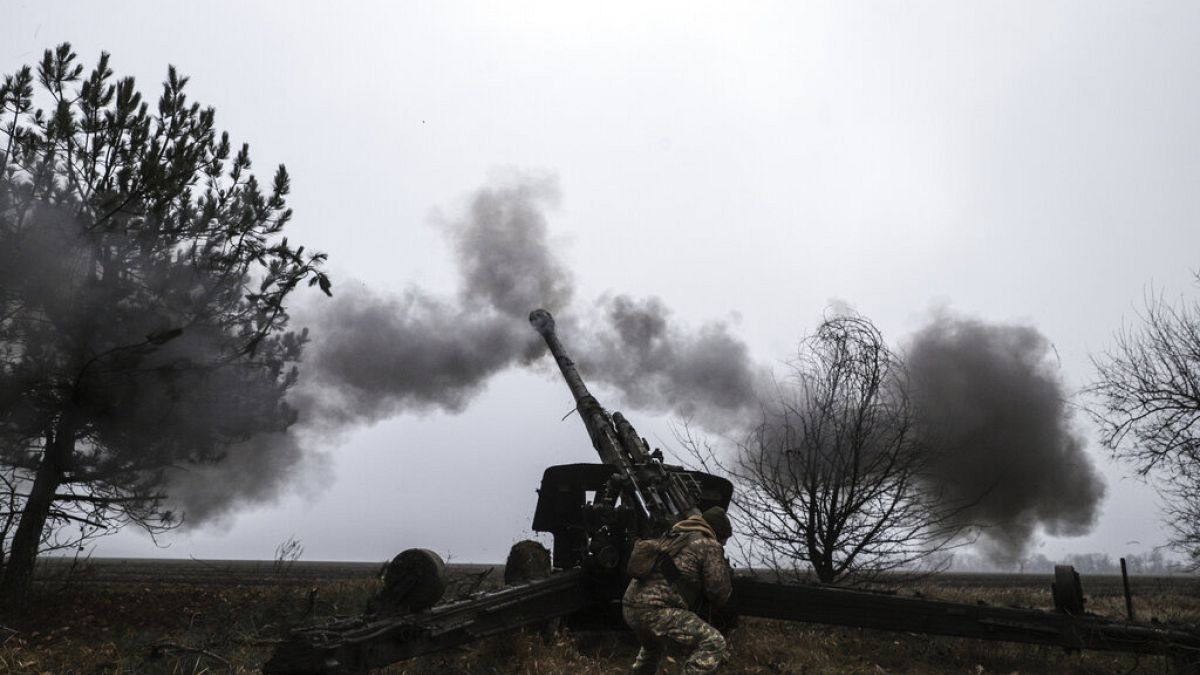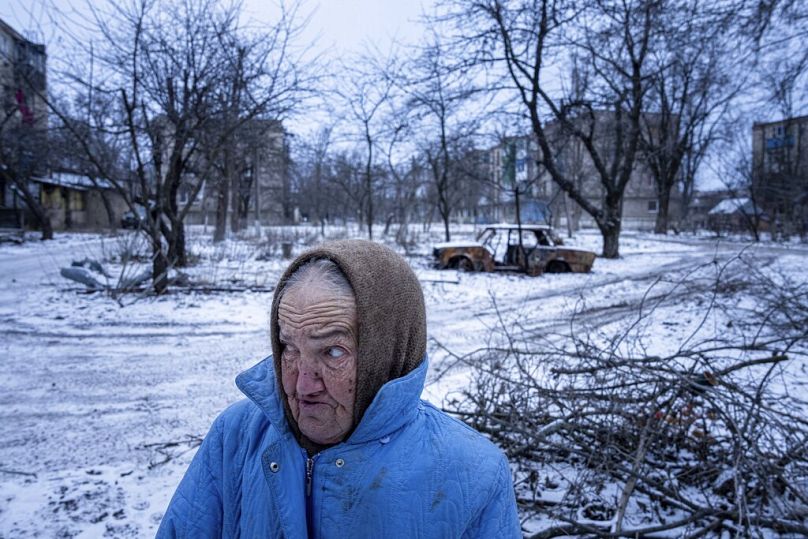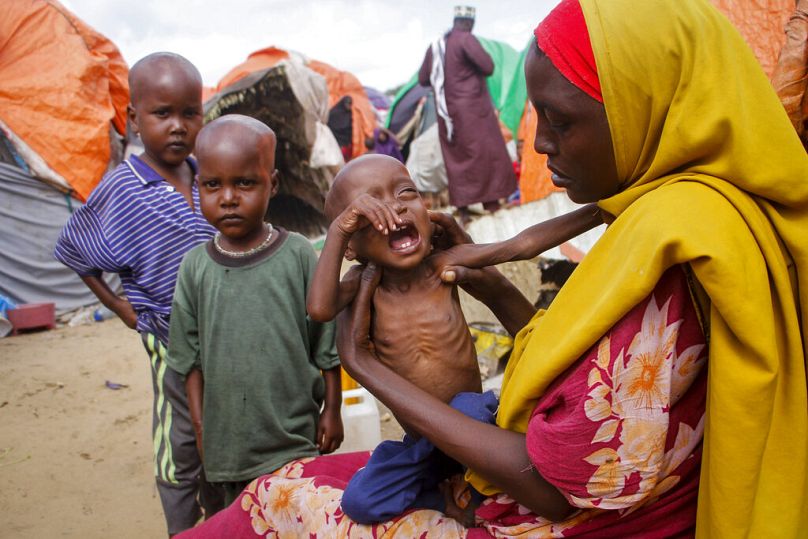Here is our round up of the latest from the war in Ukraine.
1. Savage fighting in Soledar
The fate of Soledar remains unknown on Friday, amid savage fighting between Ukrainian and Russian troops.
Moscow claimed its forces had seized the besieged eastern Ukrainian town, though this announcement was immediately rejected by Kyiv.
If true, the development would mark a rare victory for Russia, following months of damaging setbacks on the battlefield.
Soledar, a small salt mining town in the Donetsk region, has been the site of a fierce battle in recent months, with Russia pilling in mercenaries from the notorious Wagner Group.
Moscow has portrayed the grinding fight as key to seizing the strategic town of Bakhmut and the wider Donbas.
"The liberation of the town of Soledar was completed in the evening of 12 January" said Russian Defense Ministry spokesman Igor Konashenkov.
He added that the development was "important for the continuation of offensive operations in the Donetsk region."
Taking control of the town would allow Russian forces "to cut supply lines for the Ukrainian forces” in Bakhmut and then “block and encircle the Ukrainian units there,” Konashenkov said.
His statement was soon rebuffed by the Ukrainians, with a spokesperson for the country's armed forces maintaining that "heavy fighting" was still ongoing.
Since launching its invasion in February last year, Moscow has prioritised taking full control of the Donbas, a prized industrial region made up of the Donetsk and Luhansk provinces.
Russia has already seized most of Luhansk, but about half of Donetsk remains under Ukraine’s control.
Conflicting reports surround who currently controls Soledar, where the bloody battle has raged for months.
Euronews cannot independently confirm either side's claim.
The Institute for the Study of War, a US-based think tank, has said that its fall would not be "an operationally significant development and is unlikely to presage an imminent Russian encirclement of Bakhmut.”
The institute said that Russian information operations have “overexaggerated the importance of Soledar,” arguing that the long and difficult battle exhausted Russian forces.
2. Russian actor branded 'foreign agent' for Ukraine support
Russian authorities on Friday gave the infamous status of "foreign agent" to a popular actor, Arthur Smolianinov, after he said he would fight alongside Ukrainian troops against Moscow.
Smolianinov, 39, left Russia after the start of the Russian offensive in Ukraine, like thousands of other Russians.
In an interview with the opposition newspaper Novaya Gazeta Europe, he said he could see himself fighting against Russian forces last week.
"If I participated in this war, it would be on the side of Ukraine", the actor was quoted as saying.
He is well known in Russia for his role in the 2005 film "the 9th company", which takes place during the USSR's invasion of Afghanistan.
He also said he doesn't care what will happen to Russia in the future, even if the country is reduced to "radioactive ashes".
On Friday, the Russian Justice Ministry added the actor's name to its list of "foreign agents", a term widely used by the authorities to suppress critical voices.
This classification entails painful administrative procedures. The law on "foreign agents" was toughened in June, adding new prohibitions.
Smolianinov's interview caused an outcry among Kremlin supporters. On Monday, the head of the powerful Investigation Committee, Alexandre Bastrykine, ordered the opening of criminal proceedings against him.
Several other Russian personalities, including music critic Artemi Troitsky, known for his hostility to Kremlin policy, were classified as "foreign agents" on Friday.
3. Putin ally suggests seizing property of war critics who fled Russia
A close ally of President Vladimir Putin suggested on Friday confiscating the property of Russians who have left the country and who "insult" the state and its armed forces from abroad.
The proposal from Vyacheslav Volodin, speaker of the lower house of parliament, was clearly aimed at opposition figures - many already designated as "foreign agents" - who have condemned the Ukraine war after fleeing the country to avoid arrest.
"Recently, some of our fellow citizens consider it possible to insult Russia, its inhabitants, soldiers and officers, and openly support villains, Nazis and murderers," Volodin said, the latter terms referring to the forces that Moscow claims to be fighting in Ukraine.
"Their goal is clear - to curry favour and try to maintain their well-being abroad," he wrote on his Telegram channel.
Volodin said the existing legal responses to combat extremism, "rehabilitation of Nazism" or discrediting the armed forces - which is already punishable in Russia with fines and jail terms - were not sufficient to deal with these foreign-based "reprobates".
Kremlin spokesman Dmitry Peskov reacted cautiously to Volodin's proposals, saying it was a "very complicated issue" and that Russian citizens should not be treated as enemies.
"Enemies are enemies and we have to fight them, but everyone else is our citizen and they should remain our citizens," the state TASS news agency quoted Peskov as saying.
Volodin, 58, has been speaker of the lower house, the State Duma, since 2016, having previously held a senior role in the presidential administration.
As a member of Putin's Security Council, he has regular access to the president. As Duma speaker, he has ensured that key Kremlin policies move efficiently through the legislature, including laws penalising criticism of the war, placing the economy on a war footing and annexing occupied regions of Ukraine.
4. Paris and Berlin call on Africa to condemn Russian aggression in Ukraine
Top French and German diplomats called on African countries to condemn Russian aggression in Ukraine on Friday, while insisting on the EU's desire to intensify its relations with the African Union.
"It is important to remember that there is an aggressor and an attacked and it is important that everyone tells the aggressor that he must stop his aggression," said French Minister Catherine Colonna in Addis Ababa, referring to Russia.
"We have expectations of our African friends and we have shared them with you," she added, after a press briefing at the African Union's headquarters.
A similar message was delivered by her German counterpart Annalena Baerbock: "Peace in Europe is under attack... we need you, we need Africa to defend peace".
Several African states abstained from a vote of the UN General Assembly on a resolution demanding "that Russia immediately stop using force against Ukraine".
“We see the effect of this brutal Russian war all over the world and particularly in the Horn of Africa,” where Russia is using grain as a weapon of war by hampering Ukrainian deliveries, Baerbock continued.
The two ministers, who arrived in Ethiopia on Thursday for a two-day visit, spoke alongside Moussa Faki Mahamat, chairperson of the African Union Commission.
**5. Ukraine '**de facto' NATO member, says country's Minister of Defence
Ukraine has become a "de facto" member of NATO, Ukrainian Defense Minister Oleksiy Reznikov told the BBC on Friday.
In an interview, the Ukrainian minister showed he was confident the West would supply Ukraine with tanks and fighter jets, despite the reluctance of some states over fears of escalation.
"This worry about the next level of escalation, for me, is kind of a protocol," he said, dismissing fears that the supply of new weaponry would be seen by Russia as a provocation.
"Ukraine and the armed forces of Ukraine have become members of NATO. De facto, not de jure [in law]," he said, "because we have the armaments, and the understanding of how to use [them]".
"It's true. It's a fact," he added. “I am sure that in the near future we will become NATO members, de jure,” he continued.
In October, Ukraine announced a surprise, fast-tracked bid to join the western military alliance. However, leading European powers and the US have tried to dampen Kyiv's expectations, with it being highly unlikely Ukraine will join NATO any time soon.
On Tuesday, the EU and NATO promised to provide Ukraine with all the necessary means to defend itself against the Russian invasion, ahead of discussions scheduled for next week on the types of weapons that will be provided.


